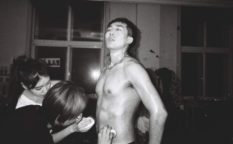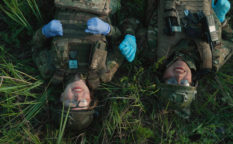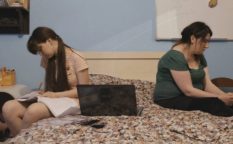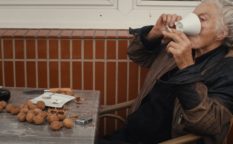Review: Marana (2020)

Different people, different perceptions of the world around them. Some are privileged to be considered mentally healthy, the others are not. In their documentary Marana, the Italian first-time filmmaking duo Giovanni Benini and Davide Provolo take us on a journey to the worlds that are not theirs. The film had its world (physical) premiere at the recently wrapped Beldocs in Belgrade, Serbia.
Opening with a teen boy in a slightly mischievous mood who’s trying to draw on a rusty barrel with a piece of brick, it isn’t easy to pinpoint what the film is about straight away. When the boy is joined by another one about the same age as him, as they begin to wander through the forest, we can’t help but asking ourselves what are they actually doing apart from idling in that late-summer landscape. The games they play might seem a bit aggressive or infantile for their age, and their plans for revitalizing the crumbling and at least temporarily abandoned touristic complex, are somewhat delusional. In that unique moment in the film with its context-free observational mode, and which could pass as an interview, the bigger lad says he wants to become a famous singer although his singing and rapping skills are not exactly stellar. He even has a name for his future stardom ready: Max Divine.
The two free-wheeling guys serve as the protagonists of the film’s first of three chapters. In the first chapter’s finale, we learn about other boys of their age living in the same place as they do, but also that the place might be some sort of a closed institution for teens with special needs. As the observations move to the other characters, some of them forlorn and uncommunicative, the nature of the institution and the world(s) they all live in becomes more clear. It is a facility for teens with autism. Since it is a spectral disease, its manifestations vary greatly.
Benini and Provolo succeed in their intentions and Marana never feels staged, manipulative or exploitative. The absence of those who take care of the young patients is a bit surprising and can lead to an illusion that they are simply left there to take care of themselves and provide therapy for one another. The filmmakers use that kind of setting in order to explore the nature of the desease, but also to examine genuine interactions among the youth and their reactions to different stimuli from the outside world.
Benini and Provolo’s camera always stays close to the “action”, usually revolving around the protagonist of the scene, the person the directors singled out for some specific event. Thanks to Pierpaolo Filomeno’s precise editing, not a single frame outstays its welcome, and the gentleness and genuine interest never turns towards something with questionable ethics. Another component that could be singled out is the score written and performed by Matias Campaci and Thomas Pizzini of Lite Orchestra, that perfectly fits with the subjects’ preferred musical choices and the fact that music can play a great part for the rehabilitation and the inclusion of persons with some form of ASD.
Marana lets their voice, sometimes not quite understandable for the outside world, be heard in a gentle and genuine fashion.
Runtime: 64’
Country: Italy
Language: Italian
Directed by: Giovanni Benini, Davide Provolo
Cinematography by: Giovanni Benini, Davide Provolo
Editing by: Pierpaolo Filomeno
Music by: Matias Campaci, Thomas Pizzini
Sound by: Giovanni Benini, Davide Provolo, Matias Campaci
Colourist: Stefano Bellamoli
Produced by: Giovanni Benini, Davide Provolo
Director of production: Ginevra Gadioli
Production companies: Diplomart Club Ambasador, Puma Punka, Ezme Film
Supported by: MEA – Mosaicoeais, A.I.A.S. Valdagno Onlus, Famiglie Mosaico
















